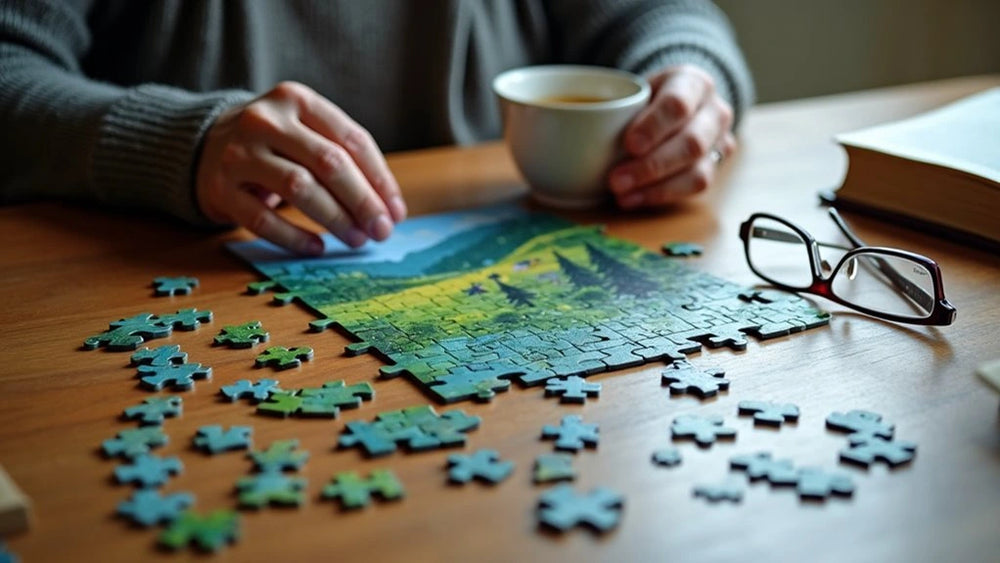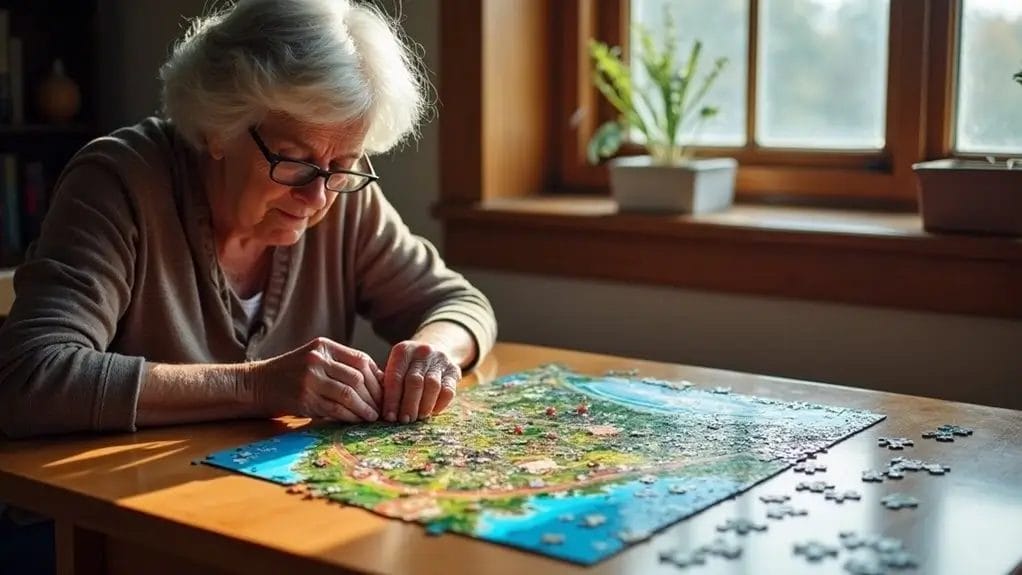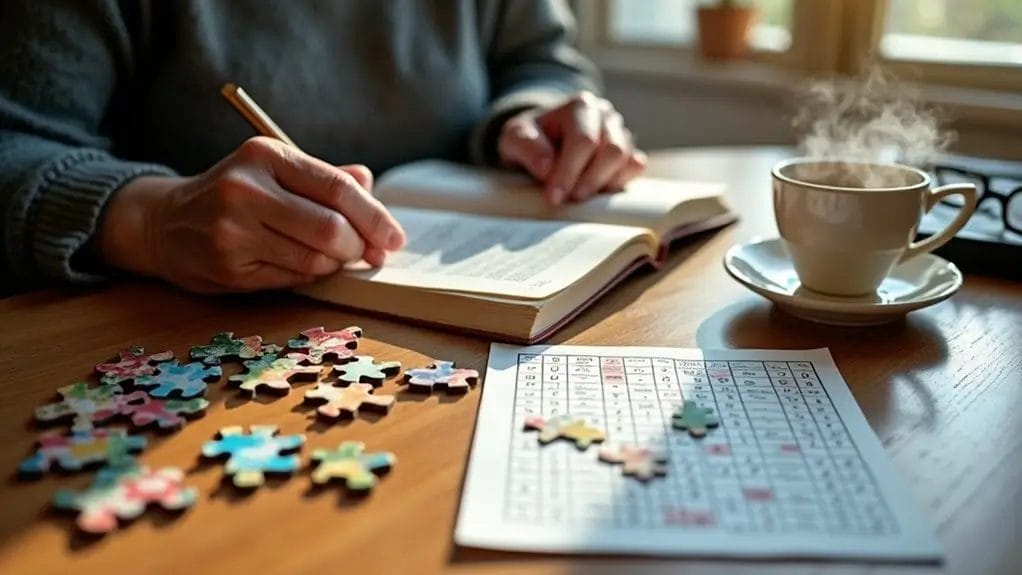
Have you heard that puzzles can help ward off dementia? But the science behind this claim deserves closer examination.
Research shows that puzzle-solving activities can strengthen neural connections and maintain cognitive function. But it's still essential to understand both their potential and limitations in fighting dementia.
If you're concerned about brain health or caring for someone with cognitive decline, it's important to know how puzzles fit into dementia prevention and management. This knowledge can greatly impact your approach to mental wellness.
Key Takeaways
- Research shows puzzles can delay the onset of dementia by up to 2.54 years when done regularly, especially in older adults.
- Puzzle-solving creates new neural pathways and builds cognitive reserve. It protects against neurodegenerative conditions like dementia.
- Puzzles cannot cure dementia. But they help maintain cognitive function and may slow mental decline.
- Different puzzle types target specific cognitive functions. Crossword puzzles help improve vocabulary and jigsaws enhance visual-spatial reasoning.
What Is Dementia?

A progressive decline in cognitive function characterizes dementia. This disease affects millions of people worldwide and greatly impacts their ability to perform daily activities.
Dementia isn't a single disease but rather an umbrella term. It encompasses various conditions that impair memory, reasoning, and problem-solving abilities.
Alzheimer's disease accounts for most cases of cognitive decline. It affects 60-80% of those diagnosed.
With over 10 million new cases annually, early diagnosis and intervention are essential.
Causes and Risk Factors of Dementia
Researchers continue to investigate the complex nature of cognitive decline. But several well-established risk factors contribute to the development of dementia.
Your age plays a vital role. The risk increases considerably after 65, particularly in women.
Your education level can serve as a protective factor. Higher educational attainment builds cognitive reserve.
Lifestyle choices considerably impact your dementia risk. Regular participation in cognitively stimulating activities and maintaining social engagement can help protect your brain health.
Environmental factors like exposure to air pollution and head injuries also influence your risk of dementia. This makes prevention a multifaceted approach.
Do Puzzles Fight Dementia? Puzzles and Brain Health
Ever wondered if puzzles could do more than just pass the time? Let’s explore their potential impact on brain health.
How Puzzles Stimulate the Brain
Research shows that puzzles serve as powerful cognitive stimulants. They activate various regions of the brain simultaneously.
When you engage in puzzles, you're exercising both brain hemispheres. This dual activation helps prevent the formation of β-amyloid plaques associated with Alzheimer's disease.
Your brain's response to puzzles goes beyond simple mental stimulation. Studies show that puzzle activities that include personal elements improve memory recall.
Regular puzzle engagement leads to improved attention scores and cognitive performance. This makes puzzles an effective tool in delaying dementia symptoms.
How Puzzles Engage Cognitive Functions
Through consistent puzzle engagement, your brain establishes essential neural pathways. This helps enhance multiple cognitive functions simultaneously.
When you solve puzzles, you're strengthening your logical reasoning and creative abilities. This dual stimulation helps protect against cognitive decline and memory loss. You'll also notice improved memory retention and problem-solving capabilities.
When you play puzzles with others, you're fostering social connections. These further support brain health and cognitive resilience.
Neuroplasticity and Brain Reserve
When you engage in puzzles regularly, you're stimulating neuroplasticity. This enables your brain to forge new neural pathways and strengthen existing ones.
This process actively builds cognitive reserve. It creates a protective buffer against future decline. Consistent puzzle-solving can delay Alzheimer's disease onset by up to five years.
Your brain's ability to adapt and reorganize supports long-term brain health. By challenging many cognitive functions at once, you enhance your mind's resilience against age-related mental decline.
Types of Puzzles and Their Benefits

Let’s explore how different puzzles might help brain health and their potential benefits.
Jigsaw Puzzles
Jigsaw puzzles help maintain brain health in individuals at risk of developing dementia.
Playing jigsaw puzzles simultaneously activates both hemispheres of your brain. It enhances your cognitive abilities through visual processing and logical reasoning.
These activities may help reduce the risk of mild cognitive impairment. They can also slow the progression of Alzheimer's disease by decreasing β-amyloid plaque buildup.
You'll gain more benefits if you choose puzzles that depict familiar scenes or personal interests. These include emotional engagement and memory reinforcement.
Crossword Puzzles
Crossword puzzles offer compelling benefits in the fight against dementia.
When you solve crosswords, you're actively strengthening many cognitive functions. These include vocabulary expansion and memory recall.
Research shows that crossword puzzles build your cognitive reserve. They provide enhanced protection against memory decline.
Sudoku
Sudoku presents a distinct cognitive challenge through numerical logic. When you play Sudoku, you're exercising both analytical and creative thinking processes. This can help maintain cognitive function as you age.
Sudoku's structured format effectively challenges your logical reasoning and problem-solving skills.
Consistent practice may slow cognitive decline. It serves as a protective measure against dementia. The puzzle's demand for attention to detail and systematic thinking helps brain health. It's a valuable tool in building cognitive reserve and maintaining mental acuity.
Brain-Training Apps and Games
As digital technology advances, brain-training apps and games have become easy tools for mental stimulation. These engaging activities specifically challenge your memory, attention, and problem-solving abilities.
Research suggests that regularly using brain training games can improve your cognitive function.
These digital platforms offer varied challenges that keep your mind active. Incorporating them into your daily routine creates a thorough approach to maintaining brain health. This strategy promotes consistent mental exercise and skill-building activities.
Limitations and Misconceptions of Puzzles
You may have heard that puzzles can cure dementia. But scientific evidence indicates a more complex reality. Puzzles may delay the onset but cannot prevent or reverse the condition.
Do Puzzles Cure Dementia?
Puzzles support brain health and may help slow cognitive decline. But they don't reverse or eliminate the disease process. Regular puzzle engagement correlates with better mental performance. It might reduce your risk of memory loss. But it's not a guaranteed preventive measure.
The benefits of puzzles depend on your specific circumstances. They should be part of a comprehensive approach to cognitive health.
Puzzles can boost your cognitive reserve and offer mental stimulation. However, they're most effective when combined with other lifestyle factors that support brain health.
The Need for a Holistic Approach
Cognitive activities like puzzles can enhance cognitive function. But you shouldn't rely on them as a standalone solution. Effective dementia prevention demands a holistic approach that combines various lifestyle factors.
Integrate puzzles with regular physical exercise, proper nutrition, and active social engagement.
The World Health Organization stresses that relying only on brain games or supplements is not enough. Instead, puzzles should be seen as one part of a comprehensive strategy. The strategy should consider different aspects of brain health and overall well-being.
Individual Variability
Research also reveals significant variations in how individuals respond to puzzle-based interventions. Cognitive benefits often depend on your baseline cognitive health and educational background.
Some people show marked improvement in memory and problem-solving abilities. But others experience minimal gains. Individual variability is particularly evident in cases of advanced dementia. At that time, puzzle engagement may yield limited results.
Puzzle activities aren't a universal solution. Instead, they're one component of a multifaceted approach to brain health. They work alongside physical exercise, social interaction, and other lifestyle factors that support cognitive function.
Tips for Incorporating Puzzles into Daily Life
Successfully integrating puzzles into daily routines requires a strategic approach.
- Establish specific times for puzzle activities, such as morning coffee or before bedtime.
- Choose puzzles that match your cognitive abilities while remaining challenging enough.
- Consider partnering with friends or family members to enhance social interaction.
- Select themes that resonate with your personal interests and memories.
- Start with shorter sessions and gradually increase duration as you build cognitive reserve.
- Remember to vary puzzle types to exercise different cognitive abilities and maintain interest.
Conclusion
You can't stave off dementia entirely through puzzles. But you'll gain significant cognitive benefits from regular puzzle-solving activities. Research shows you support your brain's neuroplasticity when engaging in various puzzle types.
Combine puzzle-solving with other evidence-based interventions, including physical exercise and social engagement. Thus, you'll maximize protection against cognitive decline. Remember that puzzles serve as one component of a thorough brain-health strategy.